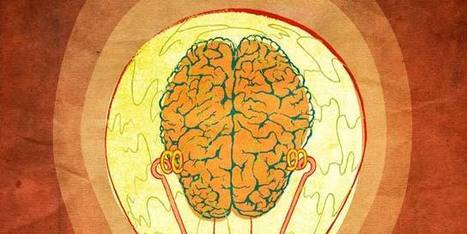It's rare for educators to be kept in the scientific loop, and rarer still to encounter research that might actually compel us to change our teaching hab
|
|
Scooped by Beth Dichter |
Research continues to learn more about how we learn, but it is not always easy to find. This post, by informEd, provides 10 suggestions based on current research, and each is discussed in more detail in the post. Below are three of the findings.
* To learn quickly, don't concentrate so hard. Over thinking can make it harder to learn.
* It matters what your learning environment looks like. Did you know that physical characteristics, "such as air quality, colour, and light" can together impact the learning process of primary students by as much as 16% in a single year."
* Understanding a student's learning process occupies the same space in the brain as practicing empathy. I suspect we have all experienced frustration when working with students, but to provide feedback that will help them empathy also plays a role.
This post provides seven additional insights that may make a difference in your classroom. Click through to learn more about research on how we learn.



 Your new post is loading...
Your new post is loading...








Um pouco de ciência para enriquecer as estratégias de aprendizagem de adultos. #avancee
Research continues to learn more about how we learn, but it is not always easy to find. This post, by informEd, provides 10 suggestions based on current research, and each is discussed in more detail in the post. Below are three of the findings.
* To learn quickly, don't concentrate so hard. Over thinking can make it harder to learn.
* It matters what your learning environment looks like. Did you know that physical characteristics, "such as air quality, colour, and light" can together impact the learning process of primary students by as much as 16% in a single year."
* Understanding a student's learning process occupies the same space in the brain as practicing empathy. I suspect we have all experienced frustration when working with students, but to provide feedback that will help them empathy also plays a role.
This post provides seven additional insights that may make a difference in your classroom. Click through to learn more about research on how we learn.
Research continues to learn more about how we learn, but it is not always easy to find. This post, by informEd, provides 10 suggestions based on current research, and each is discussed in more detail in the post. Below are three of the findings.
* To learn quickly, don't concentrate so hard. Over thinking can make it harder to learn.
* It matters what your learning environment looks like. Did you know that physical characteristics, "such as air quality, colour, and light" can together impact the learning process of primary students by as much as 16% in a single year."
* Understanding a student's learning process occupies the same space in the brain as practicing empathy. I suspect we have all experienced frustration when working with students, but to provide feedback that will help them empathy also plays a role.
This post provides seven additional insights that may make a difference in your classroom. Click through to learn more about research on how we learn.